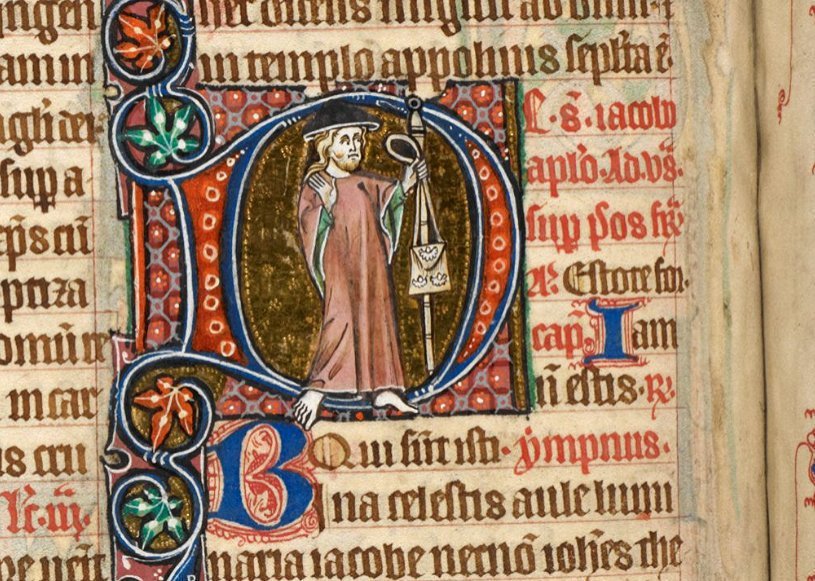 Today is the Feast of St James the Greater, Apostle, brother of St John the Apostle Evangelist and a son of Zebedee. These brother were called the “Sons of Thunder… Boanerges“.
Today is the Feast of St James the Greater, Apostle, brother of St John the Apostle Evangelist and a son of Zebedee. These brother were called the “Sons of Thunder… Boanerges“.
He was put to death around AD 42-44. His feast marks the translation of his relics which are believed to be in Santiago de Compostela, in Galicia, Spain.
Sts. Peter, John, and James were the inner core of the inner circle around the Lord.
This James is distinguished from James “the Lesser”. “Greater” perhaps refers to his age or his height. James the Less was a cousin of Christ being the son of the Mary married to Clopas (John 19:25). Alphaeus and Clopas are versions of the same name.
Back to James the Greater.
Today is the Feast of St. James the Greater.
One of the striking moments in the Gospel involving this James, with John his brother, is when their mother asks the Lord for “glory” for them. They affirm the request. They got what they asked for, but not in the way they thought. John lived to old age, the last to die, and James was the first to die: direct opposites. “Glory”, in the Gospel of John, as in John 17 when Jesus says to the Father, “Glorify your Son” and John remarks that, at Calvary, he had “seen His glory”, John means the Passion and crucifixion of the Lord. Both John and James were glorified. John did not escape martyrdom, by the way. When he was in Rome he was arrested and several times they tried to kill him, to no avail. He was exiled to Patmos.
All of us have to drink the chalice. To be with Christ in heaven, we who bear his name and mark have to follow him to the Cross before the resurrection. The chalice for most people is not martyrdom of blood. But it always has to be the martyrdom of loving obedience to God’s will as it is lived out in our vocations, whatever vocation that may be.
Each person’s vocation has its particular chalice to drink.
I note with interest a particular word in today’s Collect for St. James. Let’s see if you notice it too.
Esto, Dómine, plebi tuæ sanctificátor et custos: ut, Apóstoli tui Iacóbi muníta præsídiis, et conversatióne tibi pláceat, et secúra mente desérviat.
Variations of this appear in ancient sacramentaries, such as the Gregorian, for feasts of apostles and other occasions. There are variants, such as “Esto protector, Domine, populi tui propitiatus et rector eique…“.
A literal translation:
O Lord, be the sanctifier and the guard of your people, so that, fortified with the assistances of Your Apostle James, it may both please You by their manner of living and also zealously serve You with a tranquil mind.
A looser translation:
Protect Your people and make them holy, O Lord, so that, guarded by the help of Your Apostle James, they may please You by their conduct and serve You with peace of mind.
See it?
Custos.
Here is Pope Benedict at Santiago where the huge censer, the “Botafumerio” is charged up and swung. I can’t help but think that the Pontiff might have been slightly apprehensive.


































That is something! Not sure I could’ve focused on singing with that swinging above!
What a sight. The treasures of the church are many. I read not long ago a new church/cathedral (can’t think of the name) is opening in Virginia, and will recreate this experience there by having a huge, swinging censer. It won’t be St. James, but it will still be something people in the America’s can see.
Pingback: TVESDAY AFTERNOON EDITION – Big Pulpit
“All of us have to drink the chalice. To be with Christ in heaven, we who bear his name and mark have to follow him to the Cross before the resurrection. The chalice for most people is not martyrdom of blood. But it always has to be the martyrdom of loving obedience to God’s will as it is lived out in our vocations, whatever vocation that may be.
Each person’s vocation has its particular chalice to drink.”
Truer words were never spoken.
Reminds me of the Holy Spirit prayer:
“O Holy Spirit, beloved of my soul, I adore You. Enlighten me, guide me, strengthen me, console me. Tell me what I should do; give me Your orders. I promise to submit myself to all that You desire of me and to accept all that You permit to happen to me. Let me only know Your Will”
I saw it in action on my last time there, in 2012. It’s truly impressive.
The Wiki entry has a helpful section on “accidents”. It apparently has fallen on a few occasions, the last in 1937:
https://en.m.wikipedia.org/wiki/Botafumeiro#:~:text=In%201622%2C%20the%20Botafumeiro%20fell,a%20set%20of%20sailor%27s%20knots.
Now, what else was happening in Spain at that time? Hmmm…
I was struck (thanks to Wikipedia!) by all the cities founded on the Feast of St. James:
Sebastián de Belalcázar founded Santiago de Cali in 1536;
Francisco de Orellana founded Muy Noble y Muy Leal Ciudad de Santiago de Guayaquil in 1538;
Don Diego de Losada founded the city of Santiago de Leon de Caracas in 1567;
Ignacio de Maya founded the Real Santiago de las Sabinas in 1693…
I wonder if there are many more which were not pointed out?